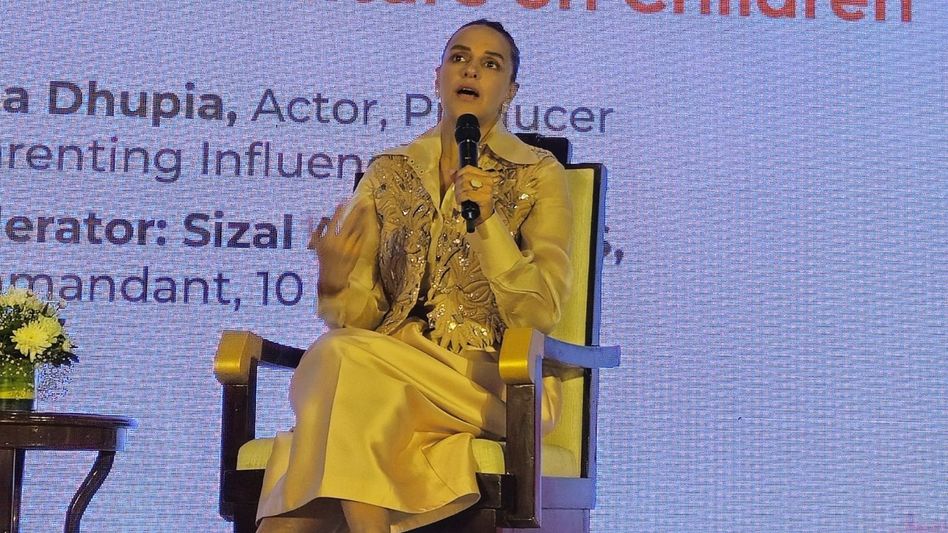‘It sends chills down my spine’: Neha Dhupia gets candid on Adolescence series at Infantia
In a candid, unscripted fireside chat, Dhupia spoke on how films, OTT content, and internet culture are shaping young minds. Without romanticising the digital age, she highlighted a pressing need: open, ongoing, and judgment-free conversations between parents and children.
 ‘It sends chills down my spine’: Neha Dhupia gets candid on Adolescence series at Infantia
‘It sends chills down my spine’: Neha Dhupia gets candid on Adolescence series at Infantia“Home needs to be their safe space.” That was the central message actor and parenting influencer Neha Dhupia emphasised today at Infantia, India’s first national dialogue on children's rights on the internet, held in Guwahati, Assam.
In a candid, unscripted fireside chat, Dhupia spoke on how films, OTT content, and internet culture are shaping young minds. Without romanticising the digital age, she highlighted a pressing need: open, ongoing, and judgment-free conversations between parents and children.
"When you talk about Netflix’s ‘Adolescence’ series, it sends chills down my spine," said Dhupia, a mother of two. "I'm still in that golden phase—my children aren't using social media." The conversation addressed growing concerns about children as young as 10 or 11 joining anonymous forums and speaking in coded language unintelligible to many parents. Dhupia acknowledged the pressure children face to fit in online spaces.
"For the lack of a better word, I think this is the language they need to 'fit in.' And if you don't fit in as a preteen or teen, you get left out—and that's dangerous," she said.
Dhupia shared a troubling observation from a personal experience at a breakfast buffet, where she witnessed a child refusing to eat until her trek video received a minimum number of likes. "I'll only eat breakfast if my trek video gets more than 15 likes," the child had told her mother. "That's where the validation is coming from—and that's scary," Dhupia emphasised.
The actor pointed out that content creators, which today includes nearly anyone with a social media account, often start seeking followers and validation. However, she urged creators to recognise their responsibility. "If you have 1 million followers—or even 50,000—you can use your voice with responsibility," she said. "For creators already doing this, amazing. For those who aren't yet—trust me, there's no shortage of followers if you use your voice in the right direction."
The discussion also touched upon the alarming trend of children developing dual identities—behaving one way at home and school, and entirely differently online.
"Imagine sending your child to school, dressed a certain way, expecting them to focus on homework. Then you come back and find they've gone viral in some reel wearing something counterfeit or inappropriate," Dhupia said, describing the scenario as "very, very worrying." She emphasised that the danger extends beyond the performance to the intentions behind it and the security risks involved.
"Those stalking online know exactly where you are. We have to teach our children that there's a boundary," she warned, revealing her own practice of never showing her children's faces on social media. "That's intentional. I don't post them because their security, their freedom matters."
Dhupia also addressed the growing phenomenon of "sharenting"—parents who overshare their children's lives online without considering long-term consequences or consent. "Where is the consent? We tell our kids to set boundaries—but are we respecting theirs?" she questioned. "Years later, they might ask, 'Who gave you the right to post this?'"
While acknowledging that parents may have different approaches, she criticized the practice of documenting a child's distress rather than addressing it. "When you're filming your child during a tantrum instead of attending to them? That's a problem," she stated. "I'd rather comfort my child than hold a phone."
When asked what advice she would give to her 14-year-old self about navigating today's digital landscape, Dhupia redirected her response to parents of teenagers. "Have conversations. Help them understand how amazing they are. Remove those pressures. Because sometimes when they can't live up to classroom pressures, they try to balance it out on social media," she advised.
She emphasised the importance of maintaining open communication and creating judgment-free environments at home. "The resolution is constant conversation—and removing judgment. Home must be a safe space," she said. "Every child develops an identity—let them explore that. And yes, even if it means checking in on what they're doing online, do it."
On the question of whether OTT platforms should take more active measures regarding age-appropriate content, Dhupia supported stronger guidelines while emphasising that real change begins at home. "It can start in schools. It can begin with conversations like this. Even Instagram has introduced technical measures to proof some content fully," she noted.
In her closing remarks, Dhupia highlighted the importance of amplifying both positive content and legitimate concerns. She referenced the hashtag #DontBeASharent, describing it as "a powerful one" that reminds parents of their responsibility for their children's online safety.
"A 'Sharent' is a parent who overshares online—maybe a little more than they should. And you don't want to be one, because your child's safety is in your hands," she concluded.
Copyright©2025 Living Media India Limited. For reprint rights: Syndications Today









